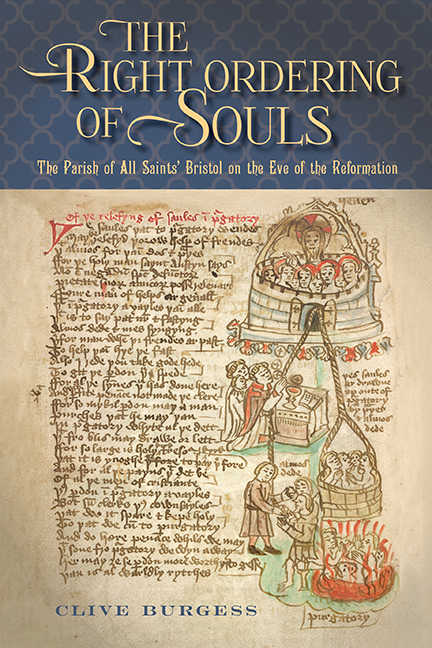Book contents
- Frontmatter
- Dedication
- Contents
- List of illustrations
- Acknowledgements
- Miscellaneous Frontmatter
- Abbreviations
- Notes
- map
- Part I For the increase of the divine service
- Part II All Saints’, Bristol, and its parishioners
- Part III Commemorating the dead
- Part IV Leaders and administrators
- 8 ‘He procured, moved and stirred’: Clergy as mentors
- 9 ‘Well willed men’: Leaders, managers and parishioners
- Coda
- Part V Ordering the parish
- Appendices
- Bibliography
- Glossary
- Index
- Miscellaneous Endmatter
9 - ‘Well willed men’: Leaders, managers and parishioners
from Part IV - Leaders and administrators
Published online by Cambridge University Press: 05 May 2018
- Frontmatter
- Dedication
- Contents
- List of illustrations
- Acknowledgements
- Miscellaneous Frontmatter
- Abbreviations
- Notes
- map
- Part I For the increase of the divine service
- Part II All Saints’, Bristol, and its parishioners
- Part III Commemorating the dead
- Part IV Leaders and administrators
- 8 ‘He procured, moved and stirred’: Clergy as mentors
- 9 ‘Well willed men’: Leaders, managers and parishioners
- Coda
- Part V Ordering the parish
- Appendices
- Bibliography
- Glossary
- Index
- Miscellaneous Endmatter
Summary
CLERGY and laity shared an obvious interest in the efficient conduct of dayto-day parish business and, as previous chapters have demonstrated, they pursued longer-term strategies with a marked attention to detail and an impressive degree of success. True to form, the materials surviving for All Saints’ shed a good deal of light on the conduct of parish affairs, on the parish's ability both to summon and sustain the regular involvement of a high proportion of its own parishioners and, at the same time, also secure close supervision from men prominent both within the neighbourhood and the municipal community. Much of what we have concerns the activities and interests of churchwardens, rendering a consideration of the contribution that these officials made to All Saints’ a convenient point of departure.
For the love of god and to profit the said church: The stewards of All Saints’
As managers acting on behalf of the body of parishioners, bearing responsibility for obligations imposed upon local communities by synodal legislation in the thirteenth century, churchwardens – also called proctors, and sometimes stewards – worked to a brief. As well as maintaining the fabric of the nave and tower, they also procured and kept the liturgical equipment necessary for the seemly celebration of the sacraments. In All Saints’, as in many other parishes, churchwardens worked in pairs, ordinarily serving a two-year term. An individual would start as junior warden, assisting a senior warden who already had a year's experience; in the following year the former assumed seniority, taking on a new junior. By the later fifteenth century, each year saw a new set of churchwardens and, accordingly, the churchwardens’ accounts for All Saints’ record activities a year at a time. Surviving accounts deal with revenues first, most of which the wardens accumulated from rents, but with collections at Easter, as well as gifts and legacies, charges for pews and for burials, and other sundries together adding worthwhile sums to the total. Following the section on income, churchwardens devoted more space, and presumably attention, to expenditure.
- Type
- Chapter
- Information
- 'The Right Ordering of Souls'The Parish of All Saints’ Bristol on the Eve of the Reformation, pp. 282 - 322Publisher: Boydell & BrewerPrint publication year: 2018

